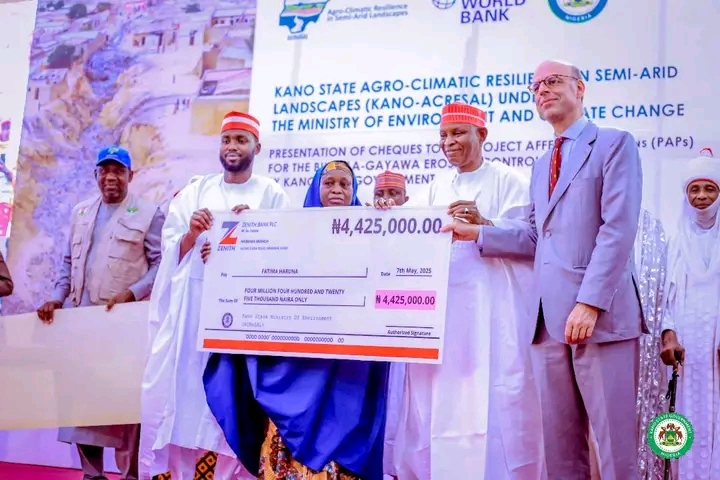By Usman Usman Garba
Kano State Governor, Alhaji Abba Kabir Yusuf, has disbursed over N600 million in compensation to residents of Bulbula and Gayawa communities affected by the ongoing erosion control project, marking a significant relief for those displaced and impacted by gully erosion.
The disbursement, which took place at the Coronation Hall of the Government House, Kano, was organized by the Kano State Agro-Climatic Resilience in Semi-Arid Landscapes (Kano-ACReSAL) under the Ministry of Environment and Climate Change.
According to a statement by the Governor’s spokesperson, Sanusi Bature Dawakin Tofa, the compensation is part of the Resettlement Action Plan (RAP) for the Bulbula-Gayawa Erosion Control Project in Nasarawa and Ungogo Local Government Areas.
The project, backed by the World Bank in collaboration with federal and state governments, aims to reclaim degraded land and restore safety through reinforced concrete channels, bioremediation buffers, and other erosion control infrastructure.
Governor Yusuf, while presenting the cheques to Project Affected Persons (PAPs), said the initiative symbolizes his administration’s commitment to dignity, security, and prosperity for the people. He assured the beneficiaries that the payments were made after due diligence, community engagement, and proper enumeration.
“Every cheque presented today is a message that the government of Abba Gida-Gida stands with its people, especially during times of hardship and displacement,” the governor said.
He lamented the hardship caused by the gully erosion, which has destroyed homes, displaced families, and turned thriving neighborhoods into danger zones. He pledged continued support for the project and promised that no community would be left behind.
Dr. Dahiru M. Hashim, Commissioner for Environment and Climate Change and Chairman of the Kano ACReSAL Steering Committee, affirmed the administration’s resolve to tackle erosion issues across the state.
He acknowledged the financial and technical support of the World Bank, federal, and state governments in making the compensation possible.
Some beneficiaries, including Jibril Abdullahi Jibril and Fatima Haruna, expressed gratitude to the government, recalling their long fight for intervention that only materialized under the current administration.


